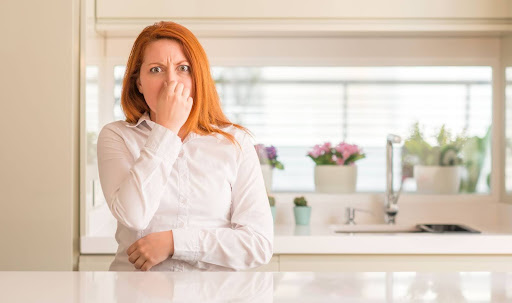If you’ve walked into your kitchen or bathroom only to be hit by a foul stench rising from the sink drain, you’re not alone. The smell is unmistakable, like rotten egg, mold, sewage, or even something burning. Not only is it unpleasant, but it can also signal that there’s something going wrong within your plumbing system.
So, what causes that awful odor? And how can you get rid of it?
Bacteria and Organic Matter Buildup in the Drain
Your kitchen sink sees a lot of action. From food scraps and grease to soap scum and oil from baking or frying, there’s a constant stream of organic matter flowing down the drain. Over time, all of that gunk clings to the inside of your pipes, creating the perfect environment for bacteria. As these bacteria break down the waste, they release hydrogen sulfide, a gas that smells like rotten eggs.
That smell doesn’t just stay in the pipe. It rises through your kitchen sink and can even drift into your bathroom or basement if the problem persists. In many cases, you can reduce the bacteria using a combination of warm water, baking soda, and vinegar. Pour the mixture down the drain and follow it with boiling water to rinse everything through.
Still smelling something unpleasant? A stubborn buildup may require professional drain cleaning with a plumbing snake or hydro jetting to fully remove the matter from your trap and pipes.
Clogged or Dry P-Trap
The P-trap is the curved section of pipe beneath your sink. It holds a small amount of water, creating a seal that prevents sewer gases from coming up into your home.
If a sink hasn’t been used in a while (such as in a guest bathroom or in the basement), the water in the trap can evaporate. Once it’s dry, sewer smells have a direct path into your living space. Fortunately, you can fix this quickly by running the tap for a few minutes to refill the trap.
However, a bad smell that lingers may indicate a leaky P-trap or corroded pipe. Look out for signs like water damage, mildew, or mold under the sink. If you spot any of those issues, it’s best to contact a professional plumber for repair or replacement.
Grease, Soap Scum, and Food Debris in the Disposal
Garbage disposal units are useful for breaking down food waste, but they also collect a lot of smelly residue. Fat, grease, meat, fruits, and veggies can all stick to the blades and surrounding pipes. As these substances decompose, they give off strong odors.
Here’s how you can clean your disposal at home:
- Drop a few ice cubes into the unit and run it to knock loose stuck debris and sharpen the blades.
- Pour in baking soda, then follow it with vinegar to create fizzing foam that loosens grime.
- Flush it all down with boiling water.
- Finish with a few drops of lemon for a fresh scent.
Avoid using harsh drain cleaners or bleach in your disposal. These products can damage the metal components and contribute to long-term corrosion in your plumbing system.
Plumbing Vent Issues and Roof Duct Blockages
Your home’s plumbing system includes vent pipes that allow gases to escape through the roof. If these roof ducts become blocked due to leaves, nests, or snow, sewer gases can’t escape properly. Instead, they may push their way back through your drains.
This kind of problem often causes multiple sinks, toilets, or even showers to smell bad at the same time. You may also notice slow drainage or changes in water pressure throughout the house.
Ventilation problems aren’t something you can fix with vinegar or a plunger. You’ll need a qualified plumber to inspect your vent stack and clear the obstruction.
Sewer Line Problems
A foul smell coming from your sink drain can sometimes indicate a much bigger problem, like a cracked sewer line. This issue can cause sewer gases to seep through your plumbing and enter your home.
If you notice gurgling noises from your toilet when you run the tap, foul smells throughout your home, or unexplained puddles in your yard, your sewer might be to blame. These situations require immediate professional plumbing services. Sewer line issues can pose risks to both your home and your health.
Luckily, Magic Plumbing has the tools and experience to diagnose and solve serious plumbing problems quickly and efficiently.
DIY Sink Drain Maintenance Tips
To prevent your sink from developing odors, routine maintenance is key. Try these tips to keep everything smelling fresh:
- Run hot water in unused sinks every week to keep traps from drying out.
- Never pour grease, oil, or fat down the kitchen sink.
- Use a drain catcher to catch food waste before it enters the drain.
- Rinse the garbage disposal regularly with boiling water.
- Avoid flushing coffee grounds, eggshells, or baking oil into the disposal.
- Clean drains monthly with a mix of vinegar, baking soda, and boiling water.
Taking small steps now can help you avoid larger plumbing problems later, and keep your kitchen and bathroom smelling clean.
When to Call a Plumber
If the smell won’t go away even after trying multiple DIY methods, don’t wait. A lingering odor could mean you have a gas leak, sewer blockage, or another hidden issue that requires professional tools and expertise. Whether the problem lies in your garbage disposal, vent system, or sewer line, calling a plumber ensures the root of the problem is handled correctly.
At Magic Plumbing, our licensed plumbers are experienced with everything from pipe corrosion and water pressure issues to grease blockages and concrete-cracked ducts. Whatever the cause of the smell, our plumbing services will get your home back to fresh and functional in no time.
Say Goodbye to Sink Drain Odors
That lingering smell in your sink drain isn’t just annoying; it’s a red flag that something is wrong. It could be food buildup, a dry trap, or something more serious like sewer gas or bacteria in your pipes. Whatever the case, don’t ignore it.
Magic Plumbing is here to help. We offer full-service plumbing solutions, including leak detection, sewer line services, drain cleaning and more. Our friendly team will work with you to diagnose the issue and deliver a solution that lasts. Call today and schedule your service!

